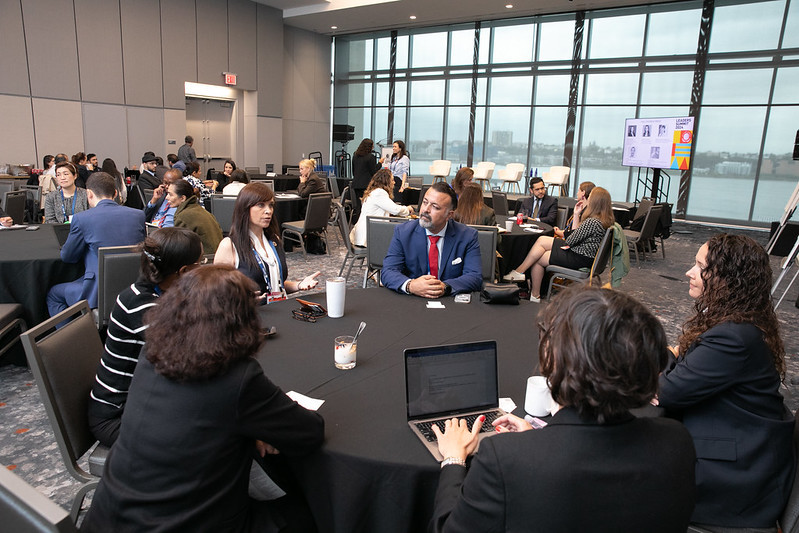Access

- Submit your institution’s Sharing Information on Progress (SIP) Report
- Access SIP reporting across institutions
Access

Access


As the world changes rapidly, higher education is under growing pressure to evolve. Accreditation bodies and ranking institutions are increasingly recognizing the need to prioritize societal impact, social responsibility, and the holistic skills students need to lead in a complex world. PRME launched a new webinar series to explore these changes, bringing together leaders from ranking and accreditation bodies, as well as PRME Signatory institutions to hear their firsthand experience.
The first session of our Accreditation & Ranking Impact series featured a dynamic panel of expert speakers exploring why accreditation bodies are increasingly emphasizing sustainability and societal impact and what that means for business schools:
Omid Aschari, Senior Advisor, PRME
George Iliev, Director, AMBA
Michele O’Dwyer, Professor, University of Limerick
Why Accreditation Standards Are Evolving
Speakers agreed that as society changes, business education must follow. George Iliev shared how Association of MBAs (AMBA) is leading the charge in reshaping accreditation standards to reflect the modern demands placed on business schools. In 2019, AMBA launched Business Graduates Association (BGA), an international membership and body of business schools with a core focus on the Sustainable Development Goals, requiring institutions to demonstrate how these principles are embedded in both teaching and practice. In 2022, AMBA introduced societal impact criteria into its accreditation process, marking a significant evolution in what “excellence” means in business education.
“We have to reflect society, criteria needs to be relevant. Changes in society need a response. Early adopters in business schools are doing something right and we want to communicate that across our networks.”
-George Iliev, AMBA
Iliev emphasized that many institutions were already contributing to sustainability and social responsibility, but lacked mechanisms to report or scale that work so they wanted to help communicate that impact to the world. AMBA’s updated standards aim to highlight and reward those efforts through tools like their Gold, Silver, and Bronze Impact Ratings, creating a clearer pathway for schools to communicate their value to the world. PRME’s Sharing Information on Progress (SIP) framework complements this effort by providing a structured, globally recognized approach to capturing and communicating sustainability initiatives - helping schools articulate their societal contributions more effectively. Together, PRME and AMBA are supporting business schools in making sustainability not just a peripheral effort, but a core element of educational excellence.
Challenges Institutions Face
Bringing the institutional lens, Professor Michele O’Dwyer shared how the University of Limerick is navigating this evolving landscape, and how accreditation can play a vital role in helping schools prioritize impact.
“Academic institutions are quite busy - what gets measured gets done. Accreditation bodies can help us focus more.”
- Michele O’Dwyer, University of Limerick
She noted that business schools are embedded within - and responsive to - society. As the demand for responsible leadership grows, accreditation helps draw attention to key areas like the circular economy, collaboration, and long-term sustainability integration.
Shared Challenges in Implementation
All speakers acknowledged the cultural shift required in institutions to fully embrace this direction. Many institutions still lack shared definitions of sustainability across departments, leading to faculty potentially viewing it differently across disciplines, and also differently on a higher institutional level. Without a shared institutional definition, efforts can be fragmented, or even fall into greenwashing.
There’s also a need to better integrate sustainability into institutional identity. Accreditation and guidance from organizations like PRME and AMBA provide both structure and legitimacy in driving this change.
Final Thoughts
This conversation underscored the importance of business education being redefined, not just to teach profit-driven skills, but to foster responsible, ethical leadership. Excellence and relevance are no longer at odds; they go hand in hand. As education becomes more collaborative and learner-centered, institutions must embrace flexibility, experimentation, and shared purpose to meet the needs of a rapidly changing world.
“The business of business is no longer just business. It’s about responsibility, relevance, and responding to societal needs.”
- Omid Aschari, PRME
Interested in learning more about how PRME and AMBA standards align? Access this session’s one pager here.